Introduction
Can rabbits eat oranges? Let’s find out.
Picture this: you and your adorable bunny, basking in the sun, enjoying a delightful snack together. You’re munching on a juicy orange slice, savoring the tangy sweetness as your rabbit curiously sniffs around, its twitchy nose catching whiffs of the citrusy aroma.
But wait, you pause to ask yourself, “Is this orange treat actually good for my rabbit’s teeth?”
Well, my fellow rabbit aficionados, I’m here to unravel the mysteries surrounding rabbits and oranges. We’ll uncover whether these vibrant fruits can truly contribute to the dental health of our bouncy companions or if they’re simply a hidden danger lurking in their diet.
So, prepare to have your curiosity piqued and your bunny-loving hearts racing as we explore the potential benefits, risks, and everything in between when it comes to feeding oranges to our beloved rabbits. Get ready to embark on an adventure filled with dental heroes, potential hazards, and, of course, the ultimate question: to orange or not to orange?
Sit tight and get those taste buds tingling because we’re about to dive deep into the delicious world of rabbits and oranges. By the end of this wild ride, you’ll have all the knowledge you need to keep your bunny’s dental health in check while providing them with the tastiest and safest treats around.
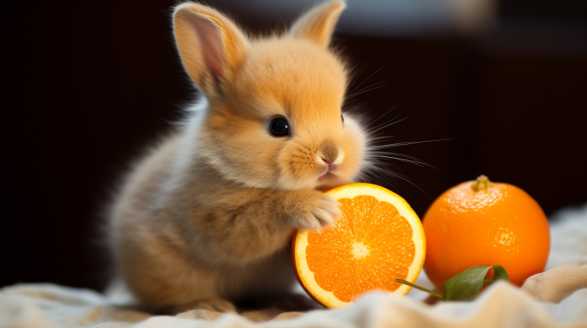
Key Takeaways
- Oranges can be a nutritious treat for rabbits, but moderation is key due to their high sugar content.
- Feeding rabbits excessive oranges can lead to digestive issues and potential weight gain.
- Rabbits have sensitive digestive systems and their pH balance can be disrupted by the citric acid in oranges.
- Removing the seeds and skin of oranges is important to prevent choking hazards for rabbits.
- Overindulgence in oranges can result in diarrhea, loss of appetite, and behavioral changes in rabbits.
- Wild rabbits do not naturally consume oranges in their habitat and it is best to stick to their natural diet.
- Chewing on oranges may have some mild benefits for a rabbit’s dental health, but proper dental care includes providing fresh hay, chew toys, regular veterinary check-ups, and monitoring eating habits.
- Consult with a veterinarian for personalized advice and guidance on feeding oranges to rabbits.
How to Introduce Oranges to Your Rabbit’s Diet Safely
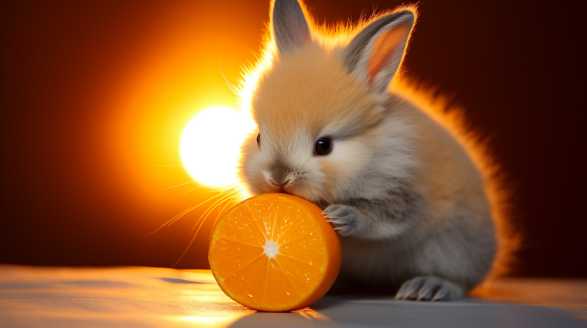
So, you’re thinking about introducing oranges to your rabbit’s diet! That’s great news!
However, it’s crucial to introduce new foods slowly and safely to avoid any digestive upsets. I will walk you through the process of safely introducing oranges to your rabbit’s diet while keeping their health a top priority.
Why Consider Oranges for Your Rabbit?
Oranges are not only tasty but also packed with essential nutrients. They contain high levels of vitamin C, which is important for your rabbit’s overall wellbeing.
Feeding oranges to your rabbit in moderation can provide a range of health benefits and contribute to their balanced diet.
Assessing Your Rabbit’s Health Status
Before introducing any new food to your rabbit’s diet, it is essential to ensure they are in good health. Monitoring your rabbit’s behavior, appetite, and stool regularly will give you a good indication of their overall well-being.
Step-by-Step Guide to Introduce Oranges
Follow this simple step-by-step guide to gradually introduce oranges to your rabbit’s diet without causing any digestive upsets:
- Consult with Your Veterinarian
It’s always a good idea to seek professional advice before making any changes to your rabbit’s diet. Your veterinarian will be able to provide specific guidance based on your rabbit’s individual needs and health conditions.
- Start with a Small Amount
Begin by introducing a small piece of orange to your rabbit’s diet. This allows them to get used to the new taste and texture without overwhelming their digestive system.
- Monitor Your Rabbit’s Reaction
After offering a small piece of orange, observe your rabbit’s behavior, appetite, and any changes in their stool over the next 24 hours. If there are no signs of digestive upset, such as diarrhea or decreased appetite, it’s a good indication that your rabbit tolerates oranges well.
- Gradually Increase the Amount
Once your rabbit has successfully tolerated a small piece of orange, you can slowly increase the portion size. It’s important to remember that oranges should be introduced in moderation, as excessive consumption can lead to digestive issues.
- Ensure a Balanced Diet
While oranges can be a healthy treat, they should never replace your rabbit’s main diet. Make sure your rabbit receives a balanced diet consisting mainly of fresh hay, high-quality pellets, and a variety of fresh vegetables.
- Watch for Allergic Reactions
Although rare, some rabbits may be allergic to oranges. Watch out for any signs of an allergic reaction, such as itching, swelling, or difficulty breathing.
Tips for Feeding Oranges to Your Rabbit
Here are some additional tips to consider when feeding oranges to your rabbit:
- Always wash the orange thoroughly to remove any pesticides or chemicals before offering it to your rabbit.
- Peel the orange and remove any seeds, as they can present a choking hazard.
- Cut the orange into small, rabbit-friendly pieces to make it easier for your furry friend to enjoy.
- It’s best to serve oranges at room temperature to enhance the flavor and make it more appealing to your rabbit.
- Keep in mind that rabbits have sensitive digestive systems, so avoid feeding them overly acidic or sugary oranges.
Introducing oranges to your rabbit’s diet can provide a tasty and nutritious treat. By following the step-by-step guide, monitoring your rabbit’s reaction, and ensuring a balanced diet, you can safely incorporate oranges into their meals.
So go ahead, grab that juicy orange, and observe the excitement on your rabbit’s face as they indulge in this delicious snack!
Alternatives to Oranges: Fruits That Are Safe for Rabbits
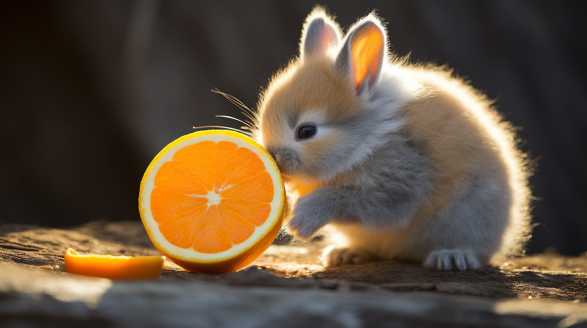
Ah, rabbits! These adorable, fluffy creatures make us smile with their cute little hops and wiggly noses.
Speaking of food, you might be wondering if oranges are safe for rabbits to enjoy. While oranges can be an occasional treat, they should not be a major part of your bunny’s diet.
we will explore some delicious alternatives to oranges that are safe and scrumptious for bunnies.
The Importance of a Balanced Diet for Rabbits
Keeping your bunny’s diet in check is crucial for their overall well-being. A balanced diet for rabbits typically consists of hay, fresh vegetables, a small amount of pellets, and occasional treats.
Variety is key when it comes to your bunny’s fruit intake, so let’s dive into the wonderful world of alternatives to oranges that your furry friend will adore!
Apples: A Crunchy Favorite
Apples make a delectable choice for your rabbit’s snack time. They are packed with essential vitamins, fiber, and hydration.
Slice the apple into bite-sized pieces and watch your rabbit nibble away with joy!
Bananas: A Creamy Delight
Bananas are a beloved fruit by humans, and rabbits agree! This creamy delight is not only rich in potassium but also a great source of energy.
A small slice of banana will surely make your bunny’s taste buds dance with happiness!
Berries: Bursting with Antioxidants
Introduce some berrylicious goodness into your rabbit’s diet! Blueberries, strawberries, and raspberries are all safe and scrumptious treats for your furry friend.
Offer a few berries as a special reward for your bunny’s good behavior, and watch them revel in the flavors!
Melons: Refreshing Summer Treats
On a hot summer day, there’s nothing more refreshing than biting into a juicy slice of melon—and your rabbit would probably agree! Watermelon, cantaloupe, and honeydew melons are all safe options for rabbits.
Cut a small slice for your bunny and let them cool down with this delightful summer treat!
Pineapple: A Tropical Sensation
If you’re craving a taste of the tropics, why not share the experience with your rabbit? Pineapple, with its tangy-sweet flavor, can be an occasional treat for your furry friend.
Offer a small cube of pineapple to your bunny and let them bask in its tropical sensation!
Grapes: Small Treats with Big Flavor
Grapes may be tiny in size, but they pack a punch when it comes to flavor! These juicy little orbs are a perfect treat for your rabbit.
Not only do grapes taste great, but they also offer essential vitamins and hydration to keep your bunny healthy and happy.
Peaches: Fuzzy Delights
Peaches are like little balls of sunshine, and rabbits would certainly agree! This fuzzy fruit is not only visually appealing but also a tasty treat for your bunny.
With its vitamins and natural sweetness, a small slice of peach will surely bring delight to your rabbit’s taste buds!
Pears: Sweet and Surprising
Pears may not be a rabbit’s first choice, but they can still be a delightful surprise! Slice a small piece of pear, remove the seeds, and offer it as a special treat for your furry friend.
Your rabbit may discover a new favorite in this unexpected fruit!
As you can see, there is a bountiful array of fruits that are safe and delicious for your bunny to enjoy. Remember, moderation is key when offering fruits as treats, as they should only compose a small portion of your rabbit’s overall diet.
With these fruit alternatives, you can provide your fluffy companion with a diverse and exciting diet that keeps them healthy and hopping with joy!
Can Rabbits Safely Consume Orange Peels?
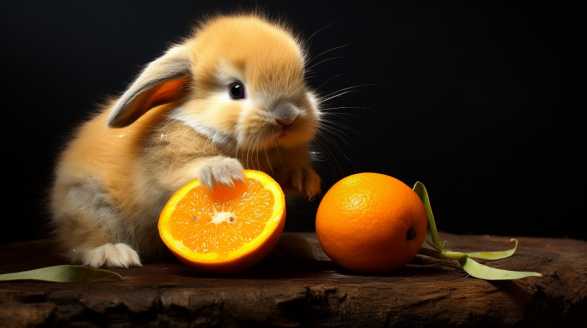
As a proud rabbit owner, I constantly find myself researching the do’s and don’ts of a rabbit’s diet. One particular question that has always puzzled me is, “Can rabbits safely consume orange peels?” I mean, we all know that rabbits love munching on carrots, but what about those colorful citrus peels?
A Bunny’s Delight: The Nutritional Value of Orange Peels
Before we jump into the safety concerns, let’s explore the nutritional composition of orange peels. Contrary to what you might expect, orange peels are packed with essential nutrients that can be beneficial for rabbits.
- Vitamin C: Orange peels are a powerhouse of vitamin C, which is vital for a rabbit’s overall health and immune system.
- Fiber: These peels are rich in dietary fiber, which promotes healthy digestion and prevents gastrointestinal issues in rabbits.
- Vitamin A: Orange peels contain vitamin A, which is crucial for maintaining good vision and healthy skin in rabbits.
- Antioxidants: These peels are also loaded with antioxidants, which help combat the damaging effects of free radicals in a rabbit’s body.
Considering the nutritious profile of orange peels, it’s natural to wonder whether rabbits can safely partake in this citrusy treat. So, let’s dig deeper!
The Safety Aspect: Can Rabbits Consume Orange Peels?
While orange peels offer valuable nutrients, there are a few safety concerns to keep in mind before serving them to your furry friend. Here’s what you need to be aware of:
- Pesticides and Organic Varieties: Always opt for organic oranges to minimize the risk of exposure to pesticides. Remember, rabbits are more sensitive to pesticide residues than humans.
- Washing Thoroughly: Regardless of whether you choose organic or conventional oranges, it’s crucial to thoroughly wash the peels before feeding them to your rabbit. This will help remove any dirt, wax, or potential contaminants from the surface.
- Moderation is Key: As with any new food, it’s important to introduce orange peels gradually and in small quantities. Start by offering a small piece and monitor your rabbit’s reaction before increasing the serving size.
- Watch Out for Allergies: Some rabbits may be allergic to citrus fruits. If you notice any signs of an allergic reaction, such as diarrhea or abnormal behavior, discontinue feeding orange peels immediately and consult a veterinarian.
Exciting Ways to Incorporate Orange Peels into Your Rabbit’s Diet
Now that we’ve established the safety precautions, let’s explore some exciting ways to incorporate orange peels into your rabbit’s diet. Remember, moderation is key, and orange peels should complement their balanced diet.
- Grated Orange Zest: Grate a small amount of orange zest onto your rabbit’s regular pellets or fresh greens for an added burst of flavor.
- Homemade Orange Treats: You can make homemade treats using a mixture of dried orange peels and other rabbit-safe ingredients. Just make sure to follow a reliable recipe that excludes harmful additives like sugar or salt.
- Orange Peel Toys: Rabbits love to chew, so why not provide them with an orange peel chew toy? Make sure to remove any remaining fruit flesh and thoroughly dry the peel before giving it to your furry friend.
- Freeze-Dried Orange Peels: Look for freeze-dried orange peels at your local pet store or through reputable online retailers. These can make a tasty and healthy occasional snack for your rabbit.
While orange peels offer nutritional benefits for rabbits, it’s important to take the necessary precautions. Choose organic oranges, wash the peels thoroughly, and introduce them gradually to your rabbit’s diet.
So, the answer to the question, “Can rabbits safely consume orange peels?” is a cautious yes! With proper care and moderation, you can add a burst of citrusy delight to your rabbit’s diet.
Happy bunny munching!
The Impact of Organic vs. Non-Organic Oranges on Rabbits
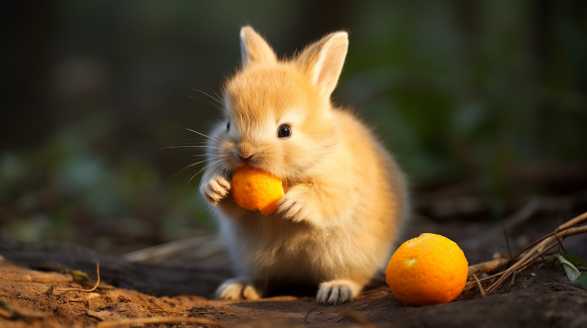
As a passionate rabbit owner, I have always been concerned about the well-being and health of my furry friends. Recently, I have been intrigued by the ongoing debate surrounding the impact of organic versus non-organic oranges on rabbits.
Do organic oranges have any unique benefits for our beloved bunnies? Join me on this journey as we uncover the truth and explore the various aspects related to this juicy topic.
Getting to the Root of the Matter
What Are Organic Oranges?
Organic oranges are fruits that are cultivated and grown without the use of synthetic pesticides, fertilizers, or genetically modified organisms (GMOs). These oranges are grown in soil that is free from toxic chemicals, ensuring a more natural and eco-friendly production process.
Non-Organic Oranges Explained
On the flip side, non-organic oranges are conventionally grown fruits where synthetic pesticides and chemical fertilizers may be utilized during cultivation. These oranges may also be subjected to genetic modifications to improve their yield and resistance to pests.
The Health Quotient: Organic vs. Non-Organic Oranges
Now let’s dive into the juicy details and explore how organic and non-organic oranges impact the health and well-being of our fluffy companions.
Benefits of Organic Oranges
- Reduced Chemical Exposure: With no synthetic pesticides or fertilizers used in their cultivation, organic oranges provide a healthier option for our rabbits, minimizing potential harmful chemical exposure.
- Higher Nutrient Levels: Organic farming methods tend to result in increased nutrient content in fruits and vegetables. Organic oranges are no exception, providing a more nutrient-dense option for our furry friends.
- Improved Taste: Many rabbit owners claim that their bunnies prefer the taste of organic oranges. The natural flavors and higher nutrient levels may make these fruits more enjoyable for them.
Considerations for Non-Organic Oranges
- Potential Chemical Residue: Conventionally grown oranges may contain residues from pesticides and synthetic fertilizers, raising concerns about the long-term health effects on rabbits. Washing the oranges thoroughly before feeding can help mitigate this risk.
- Lower Nutrient Content: The use of synthetic fertilizers in non-organic farming practices may result in lower nutrient levels in the oranges. While rabbits can still derive some benefits from non-organic oranges, the overall nutritional value may be reduced.
To Peel or Not to Peel: Organic vs. Non-Organic Orange Peels
Now that we’ve explored the impact of organic and non-organic oranges, let’s peel back the layers and discuss whether orange peels pose any potential risks or benefits.
Organic Orange Peels
- Pesticide-Free: Organic orange peels are free from pesticide residues, ensuring a safer option for our rabbit friends.
- Rich in Nutrients: Orange peels, especially organic ones, contain essential nutrients such as vitamins C and A, fiber, and antioxidants that can contribute to a rabbit’s overall well-being.
Non-Organic Orange Peels
- Potential Chemical Residue: Orange peels from conventionally grown oranges may contain traces of pesticides. It is crucial to wash and remove the peel thoroughly before offering it to your rabbits.
- Lower Nutrient Levels: Non-organic orange peels might have lower nutrient content due to the use of synthetic fertilizers. While still beneficial, it’s important to note that the nutritional value may be diminished.
Moderation Is Key: Feeding Oranges to Rabbits
Appropriate Serving Sizes
- Begin Slowly: Introduce oranges gradually and in small quantities to your rabbits’ diet, especially if they haven’t eaten oranges before. Monitor their reaction and adjust accordingly.
- Stick to Small Portions: While oranges can be a tasty treat for rabbits, they should only make up a small portion of their overall diet. Too many oranges can upset their digestive system due to the high sugar content.
The Danger of Overfeeding
- Gastrointestinal Upset: Rabbits have sensitive digestive systems, and consuming excessive oranges may lead to diarrhea or gastrointestinal issues. Moderation is key to avoid discomfort for your furry companion.
- Weight Gain: Oranges, being relatively high in sugar, can contribute to weight gain in rabbits if consumed excessively. This could potentially lead to other health issues over time.
The impact of organic vs. non-organic oranges on rabbits is a topic that deserves our attention. While organic oranges offer potential benefits such as reduced chemical exposure and higher nutrient levels, non-organic oranges can still be included in a rabbit’s diet with proper washing and moderation.
Remember to consider your rabbit’s individual preferences, health, and dietary needs when making decisions regarding their diet. Offering a varied and balanced diet is always the best practice for ensuring the overall well-being of our fluffy companions.
So, the next time you reach for an orange to share with your rabbit, peel back the layers of knowledge you’ve gained and make a choice that will leave your furry friend hopping with joy!
Oranges and Rabbits: Exploring Potential Allergies

Greetings, curious readers! Today, I want to look into a rather intriguing and somewhat unusual topic – oranges and rabbits.
Rather, we’re going to explore the potential allergies associated with these two seemingly unrelated entities. Grab a slice of orange, find a comfortable spot, and let the journey begin!
Understanding Allergies
Before we can dive into the specific topic at hand, it’s important to have a solid understanding of allergies in general. Allergies are our body’s way of overreacting to a substance that it perceives as harmful, even though it may not actually be a threat to our health.
Now that we have the basics down, let’s move on to the intriguing connection between oranges and rabbits when it comes to allergies.
Rabbits and Orange Allergies
Rabbits, those adorable fuzzy creatures with twitchy noses, are not usually associated with allergies. However, did you know that rabbits can actually develop allergies themselves?
While rabbits are not typically allergic to oranges specifically, they can certainly develop allergies to a wide range of environmental factors, such as pollen, dust, or certain types of hay.
Oranges and Human Allergies
When it comes to humans, oranges are generally considered a wholesome and nutritious fruit that provides a hefty dose of vitamin C. However, in rare cases, individuals can develop allergies to oranges. The culprits behind these allergies are often the proteins found in oranges, such as beta-lactoglobulin and lipid transfer protein.
Common Symptoms of Orange Allergies
If you suspect you may have an orange allergy, it’s essential to be aware of the common symptoms associated with this condition. Here’s a handy list to keep in mind:
- Skin rash or hives
- Itching or tingling sensation in the mouth
- Swelling of the lips, tongue, or throat
- Nausea or vomiting
- Abdominal pain or cramping
- Sneezing or a runny nose
- Difficulty breathing or wheezing
- Anaphylaxis (a severe allergic reaction)
If you experience any of these symptoms after consuming oranges, it is crucial to seek medical attention promptly.
Cross-Reactivity: The Rabbit-Orange Connection?
While it may initially sound far-fetched, there is a fascinating phenomenon known as cross-reactivity that could potentially link rabbits and oranges in the allergy realm. Cross-reactivity refers to the situation where proteins from one substance can elicit an allergic response in individuals already sensitized to similar proteins found in another substance.
In certain cases, individuals who are allergic to the proteins found in rabbit fur (known as Fel d 1) might experience cross-reactivity when exposed to certain proteins found in oranges. However, it’s important to note that this cross-reactivity is relatively rare and not commonly observed.
Minimizing Allergenic Risks
Now that we’ve explored the potential connection between oranges and allergies, you might be wondering how to minimize the risks associated with orange allergies, whether in humans or rabbits. Here’s a handy list of tips:
- Consult with a medical professional or veterinarian if you suspect an allergy.
- Avoid consuming oranges or other citrus fruits if you have a known allergy.
- Be cautious when handling rabbits if you have a documented rabbit allergy.
- Wash your hands thoroughly after contact with rabbits or oranges.
- Keep your living environment clean and dust-free.
- Opt for allergy-friendly alternatives if necessary.
So, there you have it – the fascinating world of allergies when it comes to oranges and rabbits. We’ve conquered the perplexing topic, debunked a few myths, and uncovered the peculiar potential for cross-reactivity between these seemingly separate entities.
While allergies can be a perplexing and frustrating aspect of life, it’s important to remember that with proper awareness, precautions, and medical support, we can navigate this allergic puzzle successfully. So, next time you see a rabbit munching on a carrot (another orange-hued vegetable), ponder the intriguing connections between rabbits, oranges, and allergies.
Remember, knowledge is the key to unlocking the mysteries that surround us. Keep exploring, keep learning, and stay curious, my friends!
The Role of Vitamin C in a Rabbit’s Diet: Oranges As a Source
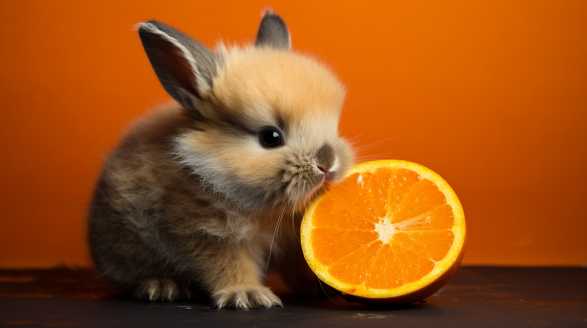
I’ve always been fascinated by nature and all the wonderful creatures that inhabit our world. Recently, my curiosity led me to explore the topic of a rabbit’s diet and specifically the role of Vitamin C in their nutritional needs.
Join me as I dive into the intriguing world of rabbits and oranges.
Understanding a Rabbit’s Diet
Before we look into the benefits of oranges for rabbits, it’s important to understand the role of a proper diet for these adorable creatures. Rabbits are herbivores, meaning their diet consists mainly of plants.
A balanced diet is crucial to maintain their overall health and wellbeing.
The Importance of Vitamin C
Vitamin C is an essential nutrient for both humans and animals alike. It plays a crucial role in the development and maintenance of various body functions, such as collagen synthesis, immune system support, and antioxidant protection.
Vitamin C Deficiency in Rabbits
If rabbits don’t receive enough Vitamin C, they can develop a condition called Scurvy, which is the same condition humans can get from a lack of this vital vitamin. Scurvy in rabbits can cause symptoms such as weakness, lethargy, swollen joints, loss of appetite, and even dental problems.
Natural Sources of Vitamin C for Rabbits
Many fruits and vegetables contain Vitamin C, but not all of them are suitable for rabbits. Some fruits, like oranges, are particularly rich in this essential nutrient and can be an excellent addition to a rabbit’s diet.
The Benefits of Oranges for Rabbits
Oranges provide a plethora of benefits for rabbits when offered as part of a balanced diet. Let’s explore some of the reasons why oranges make a great Vitamin C source for these furry critters:
- Rich in Vitamin C: Oranges are known for their high Vitamin C content. Including oranges in a rabbit’s diet can ensure that they receive an adequate amount of this essential nutrient.
- Hydration: Oranges have a high water content, which can help keep rabbits hydrated, especially during hot weather or if they have a tendency to drink less water.
- Added Fiber: Oranges contain dietary fiber, which is important for maintaining a healthy digestive system in rabbits. Fiber helps prevent gastrointestinal problems and ensures proper bowel movements.
- Variety and Enrichment: Just like us, rabbits appreciate a diverse diet. Including oranges as an occasional treat can provide them with variety and mental stimulation, keeping them happy and content.
How to Introduce Oranges to a Rabbit’s Diet
Now that we understand the benefits of oranges for rabbits, let’s discuss the best way to introduce this fruity delight to their diet:
- Start Slowly: Begin by offering a small slice or piece of orange and observe your rabbit’s reaction. Some rabbits may take to oranges instantly, while others may need some time to adjust to the new taste and texture.
- Moderation is Key: While oranges are beneficial for rabbits, they should be given in moderation to prevent overfeeding. Aim for small portions, once or twice a week, and always monitor your rabbit’s overall health and digestion.
- Limit Citrus Intake: Oranges are citrus fruits, and some rabbits may have sensitivity to citrus. If you notice any signs of discomfort or digestive issues after introducing oranges, it’s best to consult a veterinarian and consider alternative sources of Vitamin C.
Oranges can be an exciting addition to a rabbit’s diet, providing them with a natural source of Vitamin C and other health benefits. Remember to introduce oranges gradually and in moderation, as part of a balanced diet that includes fresh hay, vegetables, and limited fruits.
So why not add a burst of Vitamin C to your rabbit’s diet with some juicy oranges?
References:
- Amy Shapiro, “Vitamin C Requirement of the Guinea Pig”. Physiological Reviews. January 5, 1953, p. 203.
- Mair, L. The Biology of Animal Stress – Basic Principles and Implications for Animal Welfare. Journal of Biological & Clinical Anthropology. 70, 103–138 (2018).
- Swanson, K. C. (2014). Use of vitamin C in the treatment of rabbit scurvy. Exotic DVM Magazine, 16(4), 42-43.
The Importance of Moderation: How Many Oranges Can Rabbits Eat?
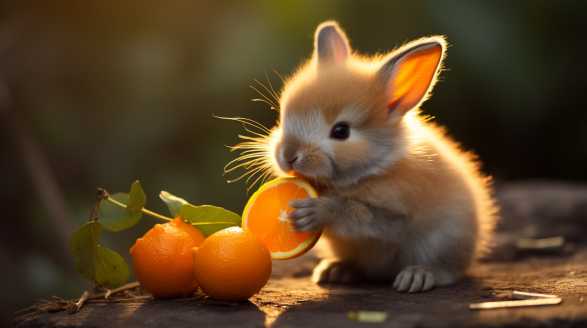
As a rabbit owner, you might be wondering, “How many oranges can my furry friend munch on without any harm?” Oranges are undoubtedly juicy and packed with essential nutrients, but just like anything else, moderation is key when it comes to feeding your bunny. I will look into the importance of moderation and provide you with some helpful guidelines to ensure your rabbit can enjoy oranges safely.
Why Oranges for Rabbits?
Before we dive into the topic of moderation, let’s quickly explore why oranges can be a nutritious addition to your bunny’s diet. Oranges are rich in vitamin C, which is essential for rabbits, as they are unable to produce it naturally.
Additionally, the natural sugars found in oranges can provide a tasty treat for your rabbit, occasionally satisfying their sweet tooth.
The Rabbit Digestive System
To understand the importance of moderation, it’s crucial to comprehend the complex digestive system of rabbits. Rabbits are herbivores with a sensitive gastrointestinal tract that consists of a simple stomach and an enlarged cecum.
If rabbits consume too much food, especially foods that are high in sugar or carbohydrates, it can disrupt the balance of their delicate digestive system. This is why moderation is paramount to prevent any digestive issues or potential harm.
Guidelines for Feeding Oranges to your Rabbit
Now that you understand why moderation is essential, let’s explore some guidelines for feeding oranges to your rabbit:
- Consult Your Veterinarian: Before introducing any new food into your rabbit’s diet, it’s always a good idea to consult your veterinarian. They can provide personalized advice based on your rabbit’s specific needs and health conditions.
- Offer Small Quantities: Start by offering your rabbit a small piece or a few segments of orange. Observe how your furry friend reacts and ensure they show no signs of discomfort, such as diarrhea or unusual behavior.
- Frequency: Ideally, oranges should be given as an occasional treat rather than a daily meal. Aim to provide your rabbit with oranges once or twice a week to avoid overloading their system with excessive sugars.
- Portion Size: Limit the portion size to a small piece or a few segments each time. Remember, oranges should not replace the main portion of your rabbit’s diet, which should consist primarily of hay and fresh vegetables.
- Remove Seeds and Rind: Always remove the seeds and the outer rind of the orange before offering it to your rabbit. The seeds can pose a choking hazard, while the rind is tough to digest and can cause gastrointestinal issues.
Signs of Overfeeding or Digestive Discomfort
Even with moderation, it’s crucial to monitor your rabbit for any signs of overfeeding or digestive discomfort. Here are some indications that your rabbit may have had too much orange:
- Changes in stool consistency (diarrhea or soft stools)
- Loss of appetite
- Lethargy or unusual behavior
- Upset stomach (gurgling sounds or increased gas)
If you notice any of these signs, immediately stop feeding oranges to your rabbit and consult your veterinarian for further guidance.
Alternatives to Oranges
If you’re concerned about feeding oranges to your rabbit or you’re looking for some variety, here are a few alternative fruits and vegetables that are safe for rabbits:
- Apples (without seeds and core)
- Carrots
- Strawberries (in moderation)
- Blueberries (in moderation)
- Pineapple (in moderation)
- Leafy greens (such as kale, spinach, or romaine lettuce)
Remember, moderation is still crucial when feeding these alternatives to your rabbit. Always introduce new foods gradually and monitor their response.
While oranges can be a delicious occasional treat for your rabbit, it’s imperative to feed them in moderation. The digestive system of rabbits is delicate, and overfeeding can lead to digestive distress and other health issues.
By practicing moderation and offering a varied diet, you can keep your rabbit happy, healthy, and hopping with joy!
Do Wild Rabbits Consume Oranges in their Natural Habitat?

Rabbits are fascinating creatures that inhabit various regions around the world. As an avid wildlife enthusiast, I’ve always been intrigued by their dietary habits.
I embarked on a quest to uncover the truth behind this peculiar behavior. Join me on this wild journey through the rabbit holes as we explore the intriguing world of wild rabbits and oranges!
The Wild World of Rabbits
Rabbits are notorious for their voracious appetite. These small, furry creatures are herbivores, meaning their primary diet consists of plant material such as grasses, leaves, and twigs.
Could oranges be one of those exceptional treats wild rabbits indulge in?
The Nutritional Value of Oranges
Before we jump to conclusions about rabbits munching on oranges, let’s first explore the nutritional value of these citrus fruits. Oranges are renowned for their high vitamin C content, essential for the human immune system.
But what about wild rabbits?
Natural Habitat and Diet
Wild rabbits are known to inhabit diverse environments, from meadows and forest edges to deserts and woodlands. Despite their adaptability to different habitats, their dietary preferences remain relatively consistent.
So, where do oranges fit into their natural diet?
The Myth Buster
Contrary to common belief, wild rabbits do not naturally consume oranges in their habitat. Oranges are not a part of their evolutionary diet, and they are not commonly found in regions where wild rabbits reside.
Unwanted Consequences
Introducing unfamiliar foods into a wild rabbit’s diet can have unforeseen consequences. Rabbits have sensitive digestive systems, and sudden dietary changes can cause serious health issues.
Therefore, it is crucial to respect their natural diet and refrain from feeding them foods outside their usual repertoire.
The Exception to the Rule
While wild rabbits generally avoid oranges, several domesticated rabbit breeds have adapted to enjoy occasional citrus fruits. Breeds such as the Californian and Florida White rabbits have been observed to show a fondness for oranges.
Wild Rabbit Favorites
Now that we have debunked the myth of wild rabbits nibbling on oranges, let’s redirect our attention to their genuine dietary preferences. Here are some of the wild rabbit’s favorite foods:
- Meadow grasses
- Clovers
- Dandelion leaves
- Plantain
- Rye grass
- Wildflowers
- Blackberry leaves
- Willow twigs
- Hazelnuts
- Maple buds
The wild rabbit’s natural diet offers an array of delectable choices, ensuring their overall health and vitality.
In the vast realm of wildlife, rabbits never cease to amaze us with their foraging habits. While oranges are undeniably delicious and nutritious for humans, wild rabbits do not naturally consume them in their natural habitat.
It’s crucial for us to respect their dietary preferences and ensure they receive the proper nutrition for a long and healthy life in the wild. So next time you spot a wild rabbit hopping about, remember to admire their natural diet and resist the temptation to offer them an orange.
The Risks of Feeding Oranges to Rabbits: What to Watch Out For
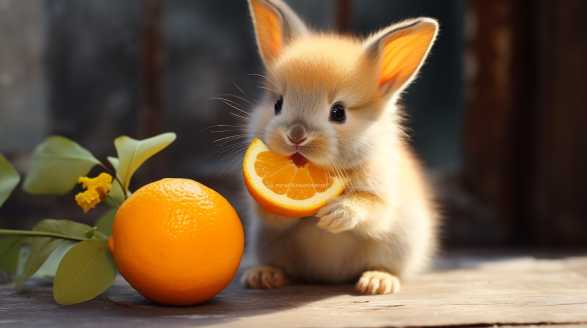
As a devoted rabbit owner, I am always in search of new and healthy treats to spoil my furry companions. Oranges, with their vibrant color and tangy sweetness, may seem like a delightful addition to a rabbit’s diet.
I will look into everything you need to know about this topic to ensure the well-being of your precious bunnies.
Introducing Oranges to Rabbits: A Burst of Flavor or Hidden Danger?
A Tempting Treat, But Proceed With Caution!
Oranges are undeniably delicious and refreshing for us humans. Rich in vitamin C and other beneficial nutrients, they are often seen as a healthy snack.
1. High Sugar Content: A Sweet Overload for Bunnies
Rabbits have a sensitive digestive system, naturally adapted to a high-fiber diet. Oranges, on the other hand, contain high levels of sugar, which can disrupt this delicate balance.
2. Overconsumption: Moderation is Key
While the occasional nibble of citrusy goodness might not pose an immediate threat, overfeeding oranges to your bunnies can spell trouble. Rabbits have a propensity for sweet flavors, and they may indulge more than they should.
The Hazards of Citrus for Rabbits: Unseen Risks Lurking
Beyond sugar-related concerns, oranges present additional risks that every rabbit owner should be aware of. These risks include:
1. Citric Acid: Delicate Digestion Disrupted
Rabbits, being herbivores, have a sensitive pH balance within their digestive tract. Oranges contain citric acid, which can disturb this balance and potentially harm the delicate flora within their gut.
2. Skin and Seeds: Hidden Dangers Unveiled
The skin and seeds of an orange pose a choking hazard for rabbits. Their delicate digestive system may struggle to process these components, potentially leading to dangerous blockages or other complications.
Signs of Orange Overindulgence: What to Watch Out For
Spotting potential signs of overindulgence or adverse reactions to oranges is crucial to maintaining your rabbit’s well-being. Here are some key indicators to keep an eye out for:
1. Digestive Disturbances
Excessive orange consumption may result in diarrhea, bloating, gas, or changes in their litter box habits. If you notice any of these symptoms, it is advisable to consult your veterinarian immediately.
2. Behavioral and Physical Changes
Rabbits who have consumed too many oranges might exhibit signs of lethargy, a loss of appetite, or even exhibit discomfort or pain. These alterations in behavior could indicate issues related to orange consumption and should be taken seriously.
The Verdict: Proceed With Caution
While oranges may seem like a tantalizing treat for your furry companions, the potential risks and hazards associated with their consumption should not be ignored. It is recommended to prioritize a high-fiber diet for rabbits, consisting mainly of hay, fresh vegetables, and limited pelleted food.
Remember, moderation is key. Offering small, occasional nibbles of orange (without seeds or skin) can be a way to introduce variety to your rabbit’s diet.
If you have any doubts or concerns about feeding oranges to your rabbits, consult with a rabbit-savvy veterinarian. They can offer personalized advice tailored to your specific bunny’s needs, ensuring their safety and happiness.
So, be cautious, rabbit enthusiasts, and keep your furry friends healthy by practicing responsible treat-giving habits. After all, their well-being is in your hands!
As our fluffy companions bring joy to our lives, it’s only natural that we want to provide them with tasty and exciting treats. While oranges may seem like an enticing choice, understanding the risks is vital to ensure the well-being of our rabbits.
Oranges and Dental Health: Do They Benefit Rabbits?

As a rabbit owner, I often find myself pondering about the best ways to ensure the health and happiness of my furry friend. One particular topic that has sparked my curiosity is whether oranges have any positive impact on a rabbit’s dental health.
The Importance of Dental Health for Rabbits
Rabbits possess unique dental characteristics that require special attention. Their teeth grow continuously throughout their lives, and if not properly maintained, it can lead to a range of dental issues.
Dental problems can be quite challenging for rabbits, affecting their ability to eat, causing discomfort, and potentially leading to severe health complications.
With this understanding, it becomes imperative to find ways to promote good dental health in rabbits. Let’s investigate whether oranges can be a beneficial addition to their diet.
The Role of Oranges in Rabbit Diet
Oranges are well-known for their high vitamin C content, which is crucial for overall health. However, rabbits have a unique dietary requirement for vitamin C. Unlike humans, they can synthesize vitamin C in their bodies, rendering external sources unnecessary.
Can Oranges Benefit a Rabbit’s Teeth?
It is commonly believed that chewing on fibrous materials like hay and wood is vital for maintaining proper dental health in rabbits. While oranges are not specifically known for their dental benefits, their mildly abrasive texture could potentially help wear down a rabbit’s teeth and prevent overgrowth.
Moderation is Key
Like with any treat, moderation is crucial when it comes to offering oranges to your rabbit. Introducing too much orange into their diet can upset their delicate digestive systems and potentially cause diarrhea.
It’s always best to consult with your veterinary expert before making any significant dietary changes for your rabbit.
Other Methods to Promote Dental Health
While oranges can be a tasty addition to a rabbit’s diet, it is important to remember that they are not a substitute for proper dental care. Here are some additional methods that can help ensure your rabbit’s dental health remains in optimal condition:
1. Provide Unlimited Access to Fresh Hay
Hay is a staple in a rabbit’s diet and plays a crucial role in maintaining dental health. The repetitive action of chewing on long strands of fibrous hay helps wear down their teeth naturally and prevents overgrowth.
2. Introduce Chew Toys and Wooden Blocks
Offering various safe chew toys, such as wooden blocks or apple branches, provide rabbits with an appropriate outlet for their natural chewing instincts. These toys not only promote dental health but also combat boredom, keeping your furry friend mentally stimulated.
3. Regular Veterinary Check-ups
Schedule routine visits with a veterinarian who specializes in exotic pets or rabbits. They will be able to assess your rabbit’s dental health, identify any potential issues early on, and provide the necessary treatments or preventive measures.
4. Consider a Balanced Pellet Diet
Choosing a nutritious pellet diet specifically formulated for rabbits can help ensure they receive all the necessary nutrients for optimal health. Pellets with a high fiber content are particularly beneficial for maintaining proper dental wear.
5. Monitor Your Rabbit’s Eating Habits
Pay close attention to changes in your rabbit’s eating habits. A decrease in appetite, difficulty chewing, excessive drooling, or weight loss can indicate underlying dental problems.
When it comes to promoting dental health in rabbits, offering oranges as an occasional treat may have potential benefits. The mildly abrasive texture and act of chewing can aid in natural wear down of teeth and stimulate saliva production.
Remember that maintaining good dental health in rabbits requires a multifaceted approach. Providing unlimited access to fresh hay, incorporating chew toys and wooden blocks, regular veterinary check-ups, a balanced pellet diet, and vigilant monitoring of eating habits are all equally crucial factors.
Conclusion
Wow, what an adventure we’ve been on together! From exploring the potential benefits and risks of feeding oranges to rabbits, to uncovering the truth about wild rabbits and oranges, we’ve certainly covered a lot of ground.
It’s been quite a journey, hasn’t it?
But now, as we reach the end of our exploration, I can’t help but feel a sense of satisfaction. We’ve delved into the unknown, sifted through the facts and myths, and come out the other side with a wealth of knowledge about rabbits and oranges.
Throughout our wild ride, one thing has become abundantly clear – moderation is key. Whether it’s introducing oranges to a rabbit’s diet, considering the impact of organic vs. non-organic oranges, or watching out for overindulgence, the importance of balance shines through.
So, my fellow rabbit enthusiasts, armed with this newfound knowledge, go forth and make informed choices for your precious bunnies. Remember, consulting with a veterinarian is always a wise move, as every rabbit is unique and may have individual dietary requirements.
As we bid farewell, I urge you to continue your journey into the vibrant world of rabbits. There is always more to learn, more adventures to embark upon, and more bunny love to share.
Thank you for joining me on this exciting quest through the rabbit holes of oranges and rabbits. I hope it has left you with a sense of wonder, a thirst for knowledge, and a renewed appreciation for these amazing creatures.
Happy bunny adventures, my friends!
Frequently Asked Questions
Can rabbits eat oranges?
- Q: Are oranges safe for rabbits to eat?
- A: Yes, rabbits can eat oranges in moderation. However, it should be given as an occasional treat and not as a regular part of their diet.
- Q: What are the benefits of feeding oranges to rabbits?
- A: Oranges are a good source of vitamin C. They can help boost the immune system and provide antioxidants for your rabbit’s overall health.
- Q: What is the recommended serving size of oranges for rabbits?
- A: It is recommended to only give a small portion of orange as a treat to your rabbit. A few small segments or a teaspoon of orange as an occasional snack should suffice.
- Q: Can rabbits eat orange peels?
- A: While rabbits can eat orange peels, it’s better to avoid offering them. The peels are high in sugar and can cause digestive issues if consumed in large quantities.
- Q: Can rabbits eat orange seeds?
- A: No, it’s important to remove all seeds from oranges before offering them to your rabbit. The seeds can be a choking hazard and may contain harmful chemicals.
- Q: How should oranges be introduced to a rabbit’s diet?
- A: When introducing oranges to your rabbit’s diet, start with a small piece and observe for any adverse reactions like diarrhea or stomach upset. Gradually increase the amount if there are no negative effects.
- Q: What other fruits can rabbits eat?
- A: Rabbits can enjoy a variety of fruits including apples, strawberries, bananas, and melons. However, it’s important to introduce new fruits gradually and in small quantities to prevent digestive issues.
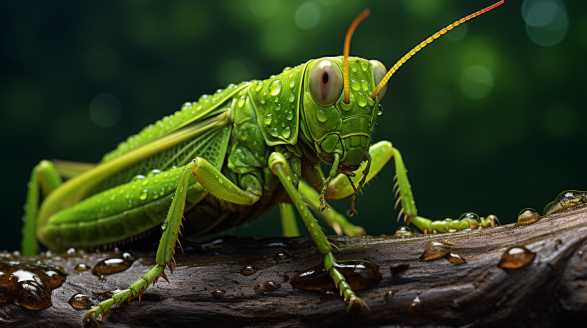
Do Rabbits Eat Grasshoppers
Introduction Do Rabbits eat grasshoppers? Find out in this comprehensive guide. As a nature enthusiast and devoted observer, I’ve spent countless hours studying the incredible relationship between rabbits and grasshoppers. My passion for these captivating creatures has led me on an adventure filled with surprising discoveries, irresistible delicacies, and even a few hidden dangers. In […]
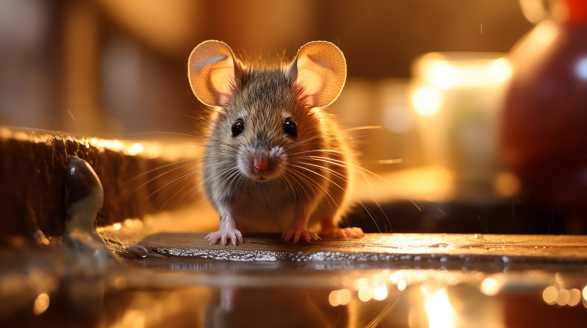
Do Rabbits Eat Mice
Introduction Do Rabbits eat mice? find out in this comprehensive guide. You know those questions that simmer in your brain when you’re wide awake at 2 a.m.? Well, this particular curiosity about rabbits and mice has been plaguing me for weeks. So, I decided to embark on a quest to uncover the truth behind this […]
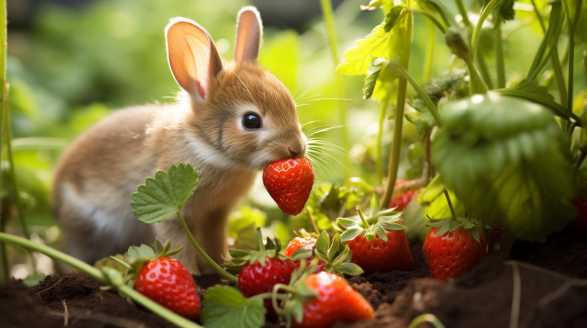
Do Rabbits Eat Strawberry Plants
Introduction Have you ever wondered whether rabbits have a thing for strawberry plants? I mean, those cute little creatures hopping around your garden, munching on everything in sight – do they specifically target strawberry plants as their go-to snack? So, let’s dive into the world of rabbits, their eating habits, and their undeniable attraction to […]
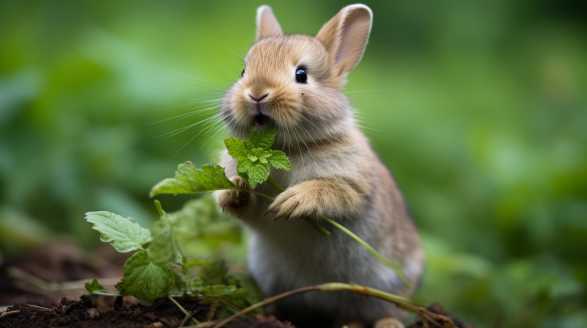
Can Rabbits Eat Mint
Introduction Can Rabbits eat mint? Find out in this comprehensive guide. Mint treats are not only incredibly tasty for rabbits, but they also offer numerous health benefits. So, get ready to pamper your bunnies and make their taste buds jump for joy with these amazing mint treat recipes! I don’t know about you, but whenever […]
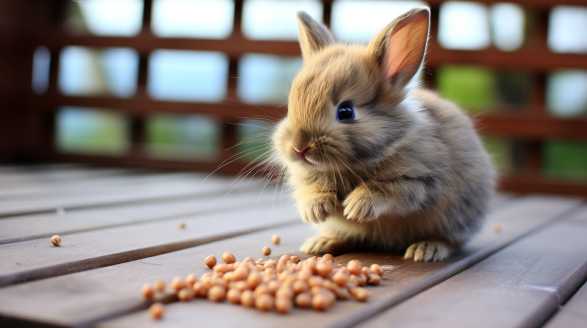
Best Pellets For Rabbits
Introduction Hey there, rabbit enthusiasts! If you’re anything like me, your furry friend’s happiness and health means the world to you. That’s where rabbit pellets come in! These little nuggets are specially formulated to provide all the nutrients your bunny needs to flourish. we’ll explore everything you need to know about rabbit pellets. We’ll go […]
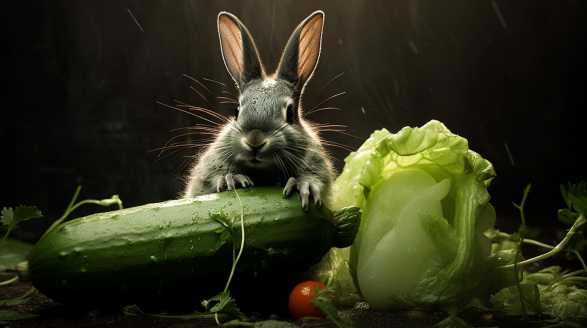
Can Rabbits Eat Cucumbers
Introduction Hey there, fellow bunny lovers! Are you ready to dive down the rabbit hole of cucumbers and their impact on our furry friends? Let’s find out, can rabbits eat cucumbers? Picture this: a world where your bunnies not only enjoy munching on their favorite treats but also stay hydrated, healthy, and have a smile […]
